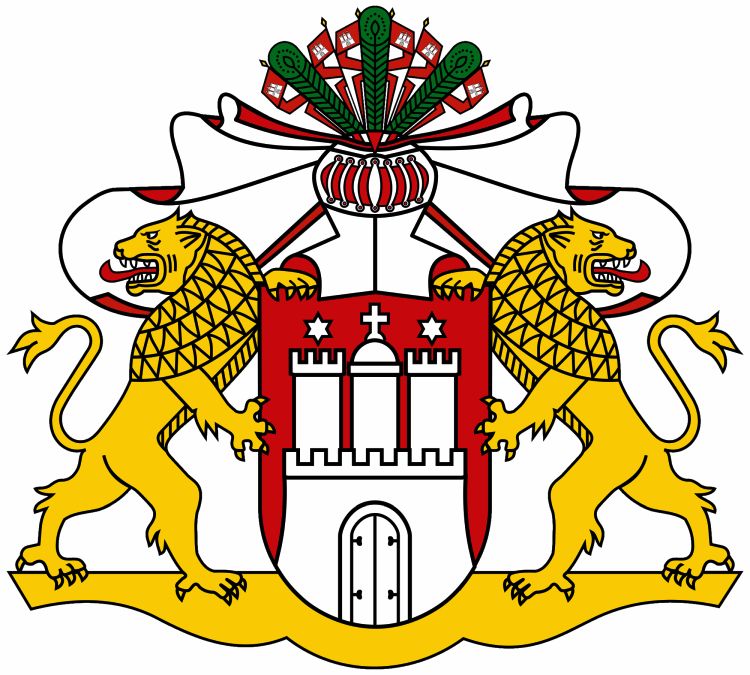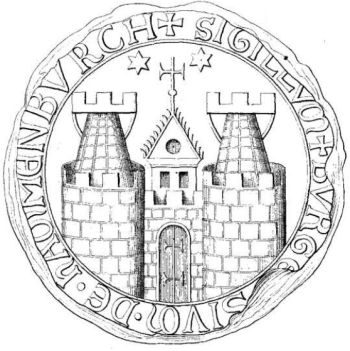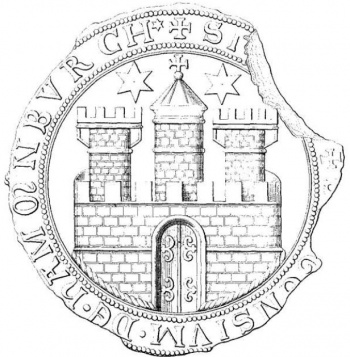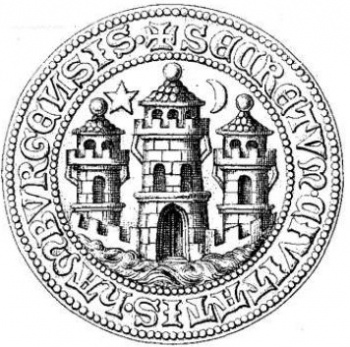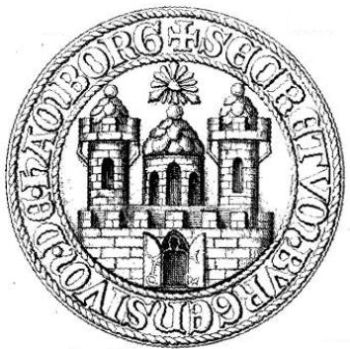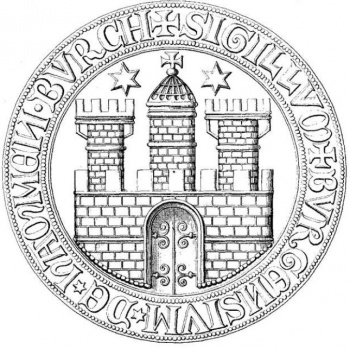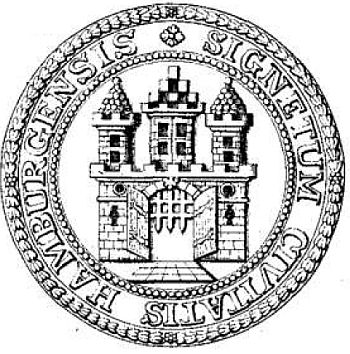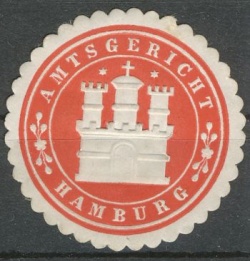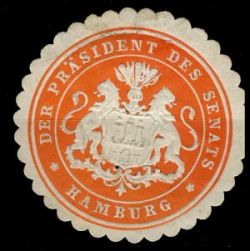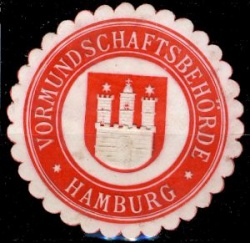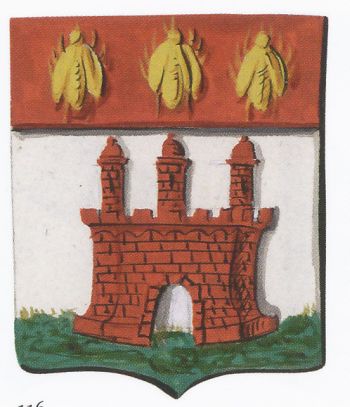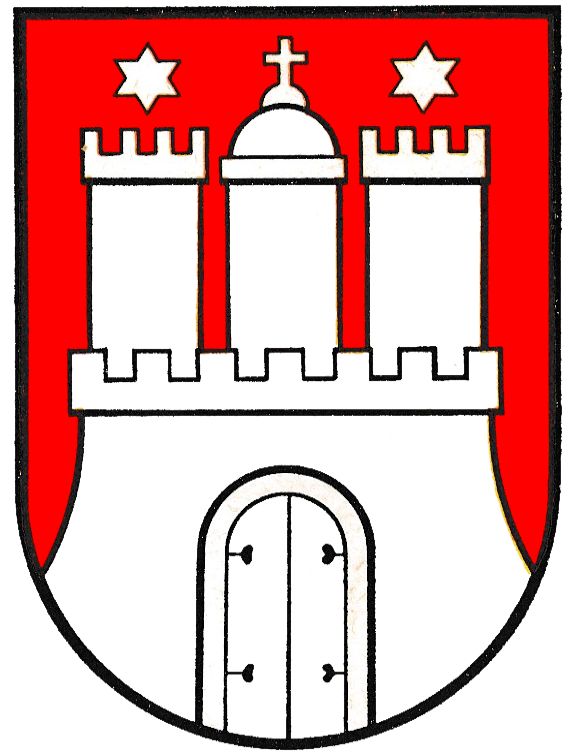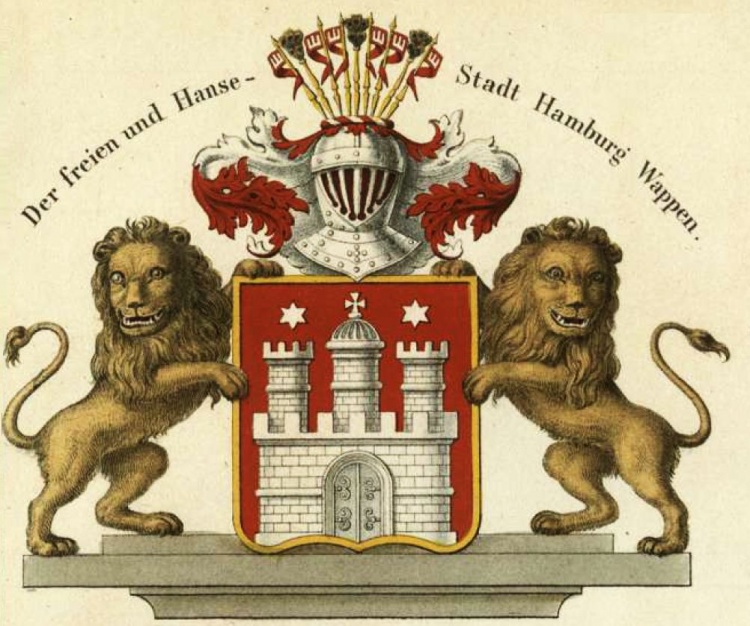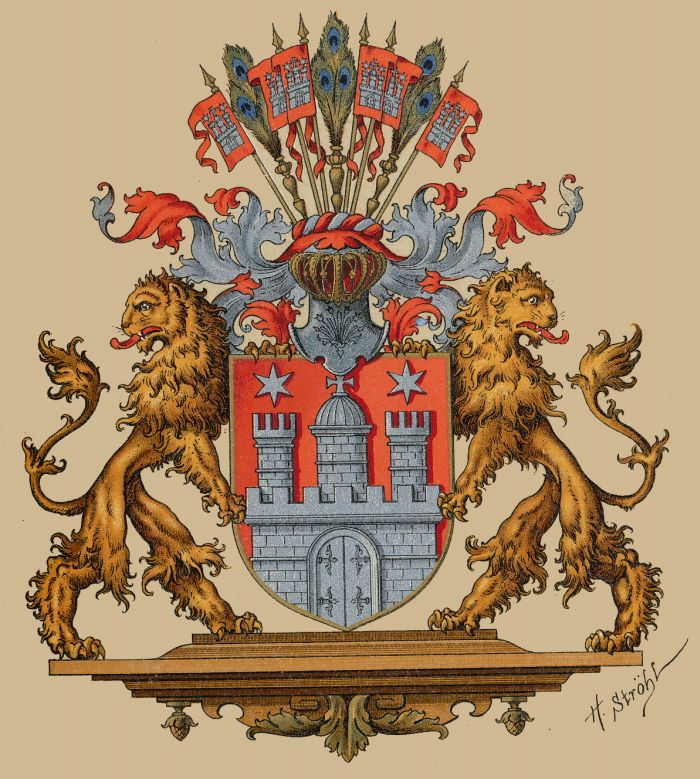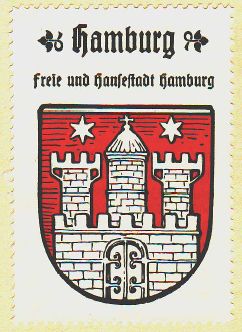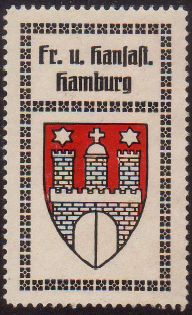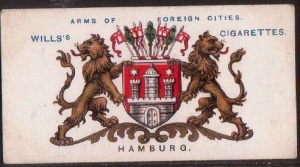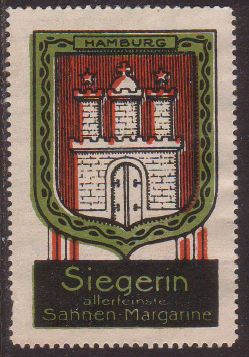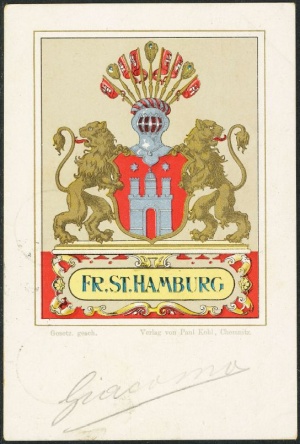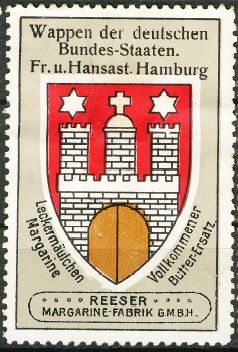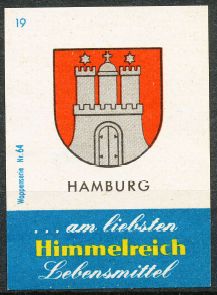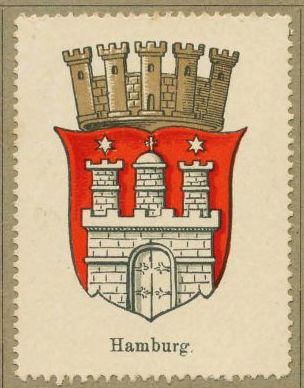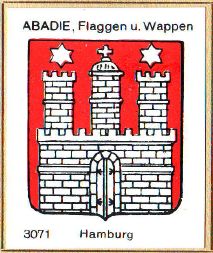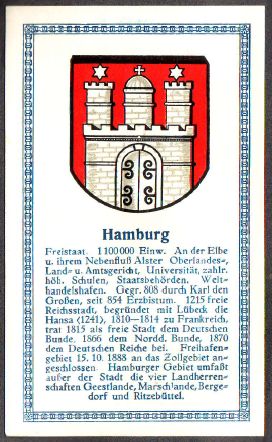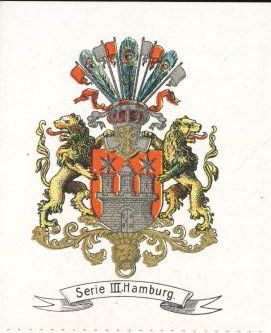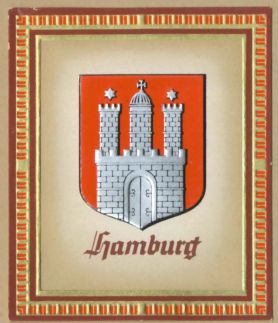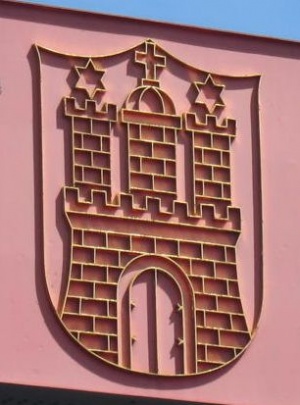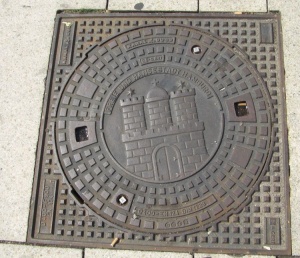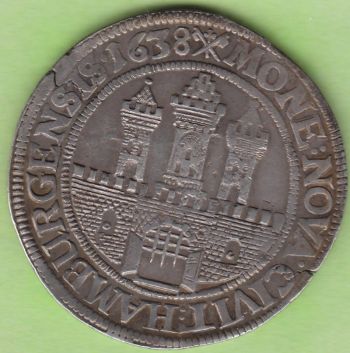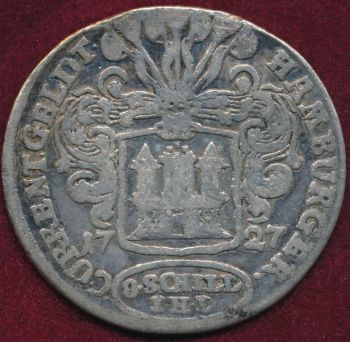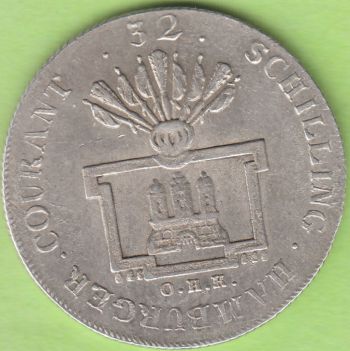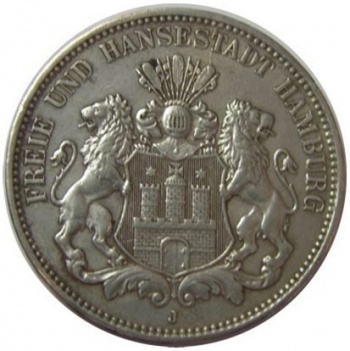Hamburg: Difference between revisions
Knorrepoes (talk | contribs) |
Knorrepoes (talk | contribs) |
||
| Line 25: | Line 25: | ||
|} | |} | ||
{|align="center" | {|align="center" | ||
|align="center"|[[File:hamburgz1.jpg|center|| | |align="center"|[[File:hamburgz1.jpg|center|250 px|Siegel von {{PAGENAME}}]] <br/> | ||
|align="center"|[[File:hamburgz2.jpg|center|| | |align="center"|[[File:hamburgz2.jpg|center|250 px|Siegel von {{PAGENAME}}]] <br/>Seals of Hamburg around 1900 | ||
|align="center"|[[File:hamburgz3.jpg|center|| | |align="center"|[[File:hamburgz3.jpg|center|250 px|Siegel von {{PAGENAME}}]] <br/> | ||
|} | |} | ||
In 1510 the city became an Imperial city, in 1618 a free city (which Denmark did not recognize until 1768). In 1815 Hamburg joined the German Empire, and since 1919 it is one of the states of Germany. | In 1510 the city became an Imperial city, in 1618 a free city (which Denmark did not recognize until 1768). In 1815 Hamburg joined the German Empire, and since 1919 it is one of the states of Germany. | ||
In Napoleonic times the colours were inverted (a red castle on a silver shield), as the addition of a red head with the golden bees (the symbol of a city of the first order) did not fit with a red shield. | |||
{|align="center" | |||
|align="center"|[[File:hamburgnap.jpg|center]] <br/>Arms of Hamburg during Napoleonic times | |||
|} | |||
The whole arms as they are now were first used officially in 1695 and were officially granted in 1835. | The whole arms as they are now were first used officially in 1695 and were officially granted in 1835. The only municipality is Hamburg, after the merger of 33 municipalities in 1937. | ||
The helmet with the the feathers already appeared in the 16<sup>th</sup> century and are derived from the counts of Holstein. The lions appeared in the 17<sup>th</sup> century. | The helmet with the the feathers already appeared in the 16<sup>th</sup> century and are derived from the counts of Holstein. The lions appeared in the 17<sup>th</sup> century. | ||
| Line 47: | Line 51: | ||
|align="center"|[[File:hamburg3.jpg|center|750 px|Wappen von {{PAGENAME}}]] <br/>The great arms from around 1900 by Ströhl | |align="center"|[[File:hamburg3.jpg|center|750 px|Wappen von {{PAGENAME}}]] <br/>The great arms from around 1900 by Ströhl | ||
|} | |} | ||
The arms on collector's items: | |||
{|align="center" | {|align="center" | ||
|align="center"|[[File:hamburg.hagd.jpg|center|Wappen von {{PAGENAME}}]] <br/>The arms by [[Otto Hupp|Hupp]] in the [[Kaffee Hag albums]] +/- 1925 | |align="center"|[[File:hamburg.hagd.jpg|center|Wappen von {{PAGENAME}}]] <br/>The arms by [[Otto Hupp|Hupp]] in the [[Kaffee Hag albums]] +/- 1925 | ||
|align="center"|[[File:hamburg.unk2.jpg|center|Wappen von {{PAGENAME}}]] <br/>The arms from around +/- 1925 | |align="center"|[[File:hamburg.unk2.jpg|center|Wappen von {{PAGENAME}}]] <br/>The arms from around +/- 1925 | ||
|- | |||
|align="center"|[[File:hamburg.wfc.jpg|center|300 px|Arms (crest) of {{PAGENAME}}]] <br/>The arms on a British cigarette card, +/- 1906 | |align="center"|[[File:hamburg.wfc.jpg|center|300 px|Arms (crest) of {{PAGENAME}}]] <br/>The arms on a British cigarette card, +/- 1906 | ||
|align="center"|[[File:hamburg.sieg.jpg|center|Wappen von {{PAGENAME}}]] <br/>The arms from around +/- 1920 | |||
|- | |- | ||
|align="center"|[[File:hamburg.kohl.jpg|center|300 px|Wappen von {{PAGENAME}}]] <br/>The arms on a postcard, +/- 1900 | |align="center"|[[File:hamburg.kohl.jpg|center|300 px|Wappen von {{PAGENAME}}]] <br/>The arms on a postcard, +/- 1900 | ||
|align="center"|[[File:hamburg.rees.jpg|center|300 px|Wappen von {{PAGENAME}}]] <br/>The arms from around +/- 1920 | |align="center"|[[File:hamburg.rees.jpg|center|300 px|Wappen von {{PAGENAME}}]] <br/>The arms from around +/- 1920 | ||
|- | |- | ||
|align="center"|[[File:hamburg.him.jpg|center|Wappen von {{PAGENAME}}]] <br/>The arms on a matchbox label, 1960s | |align="center"|[[File:hamburg.him.jpg|center|Wappen von {{PAGENAME}}]] <br/>The arms on a matchbox label, 1960s | ||
| | |align="center"|[[File:138b.wsa.jpg|center|Wappen von {{PAGENAME}}]] <br/>The arms in the [[Wappen-Sammlung Series 2 Cities and regions|Wappen-Sammlung]] (+/- 1910) | ||
|- | |||
|align="center"|[[File:3071.aba.jpg|center|Wappen von {{PAGENAME}}]] <br/>The arms in the [[Abadie]] albums | |||
|align="center"|[[File:hamburg.abd.jpg|center|300 px|Wappen von {{PAGENAME}}]] <br/>The arms in a 1930s [[Abdulla-Wappen der Bekanntesten und Bedeutendsten Ausländischen Hauptstädte|album]] | |||
|- | |||
|align="center"|[[File:hamburg.cva.jpg|center|Wappen von {{PAGENAME}}]] <br/>The arms in a [[Continentale Verlags Anstalt|German album]] +/- 1910 | |||
|align="center"|[[File:hamburg.aur.jpg|center|Wappen von {{PAGENAME}}]] <br/>The arms in a 1936 [[Staats-Wappen und Flaggen (Unter dem Olympia-Banner)|album]] | |||
|} | |||
The arms in the city: | |||
{|align="center" | |||
|align="center"|[[File:hamburgbrucke.jpg|center|300 px|Wappen von {{PAGENAME}}]] <br/>The arms on the Elbe-bridge | |||
|align="center"|[[File:hamburg-cover.jpg|center|300 px|Wappen von {{PAGENAME}}]] <br/>The arms on a manhole cover | |align="center"|[[File:hamburg-cover.jpg|center|300 px|Wappen von {{PAGENAME}}]] <br/>The arms on a manhole cover | ||
|} | |} | ||
| Line 71: | Line 90: | ||
|} | |} | ||
Revision as of 07:35, 10 January 2018
This page is part of the German heraldry portal Deutsche Wappensammlung |
Heraldry of the World |
|
German heraldry:
|
Selected collector's items from Germany:
|
HAMBURG
State : Hamburg
Additions : 1937 Altenwerder, Altona (1889 Ottensen), Bergedorf, Bergstedt, Billstedt, Bramfeld, Cranz, Curslack, Duvenstedt, Finkenwerder (partly), Fischbek, Francop, Gut Moor, Harburg-Wilhelmsburg (1927 Harburg, Wilhelmsburg), Hummelsbüttel, Langenhorn, Lemsahl-Mellingstedt, Lohbrügge, Lokstedt, Marmstorf, Neuenfelde, Neugraben, Neuland, Poppenbüttel, Preußisch Kirchwerder, Rahlstedt, Rönneburg, Sasel, Sinstorf, Steilshoop, Wandsbek, Wellingsbüttel
Origin/meaning
Hamburg developed around a small fortress, used by the people as a refuge in the early Middle Ages (6th-9th century). In 831 an Archishop of Hamburg was mentioned, in 835 already an Archbishop. It is not quite sure when the village became a city, probably in the early 12th century.
In 1188 the new-city or Neustadt was founded by Count Adolf of Schauenburg-Holstein. In 1215 the two cities were united under the counts of Holstein, and since 1461 the Kings of Denmark. Although the Kings of Denmark were the official overlords, the city was practically independent.
The oldest known seal dates from 1241, on which is shown a castle made of three towers. The cross on the middle tower as well as the two stars are already present. The middle tower could thus indicate the largest church, the Holy Mary Church. The stars are aslo a common symbol for the St. Mary. All other seals of the city show the castle, the shape, however, differs between the seals. On some smaller 13th -14th century seats the castle is standing on a river and the stars are replaced by a half-moon (crescent). The castle also appears on coins minted in the 13th century.
| The seal of Hamburg in 1241 |
The seal of Hamburg in 1254 |
| The seal of Hamburg in 1309 |
The seal of Hamburg in 1318 |
| The seal of Hamburg in 1554 |
The seal of Hamburg in 1743 |
| |
Seals of Hamburg around 1900 |
|
In 1510 the city became an Imperial city, in 1618 a free city (which Denmark did not recognize until 1768). In 1815 Hamburg joined the German Empire, and since 1919 it is one of the states of Germany.
In Napoleonic times the colours were inverted (a red castle on a silver shield), as the addition of a red head with the golden bees (the symbol of a city of the first order) did not fit with a red shield.
| Arms of Hamburg during Napoleonic times |
The whole arms as they are now were first used officially in 1695 and were officially granted in 1835. The only municipality is Hamburg, after the merger of 33 municipalities in 1937.
The helmet with the the feathers already appeared in the 16th century and are derived from the counts of Holstein. The lions appeared in the 17th century.
As far as known the colours have always been a silver castle on a red shield.
| The present arms of Hamburg for daily use (middle and small arms) |
| The great arms (Gaedechens, 1855) |
| The great arms from around 1900 by Ströhl |
The arms on collector's items:
| The arms by Hupp in the Kaffee Hag albums +/- 1925 |
The arms from around +/- 1925 |
| The arms on a British cigarette card, +/- 1906 |
The arms from around +/- 1920 |
| The arms on a postcard, +/- 1900 |
The arms from around +/- 1920 |
| The arms on a matchbox label, 1960s |
The arms in the Wappen-Sammlung (+/- 1910) |
| The arms in the Abadie albums |
The arms in a 1930s album |
| The arms in a German album +/- 1910 |
The arms in a 1936 album |
The arms in the city:
| The arms on the Elbe-bridge |
The arms on a manhole cover |
The arms on coins of the city (images from auction sites)
| The arms on a coin, 1638 |
The arms on a coin, 1727 |
| The arms on a coin, 1794 |
The arms on a coin, 1910 |
Contact and Support
Partners:
Your logo here ?
Contact us
© since 1995, Heraldry of the World, Ralf Hartemink 
Index of the site
Literature : Stadler, 1964-1971, 8 volumes; Gaedechens, 1855


